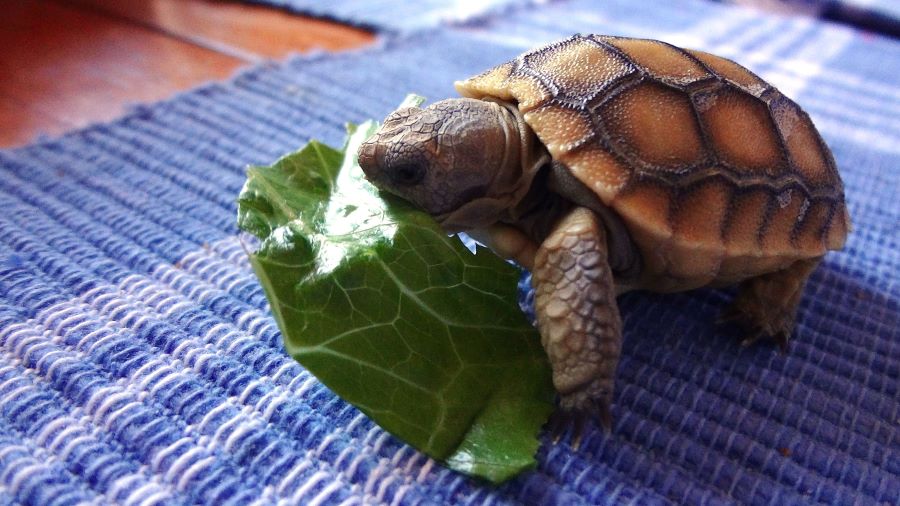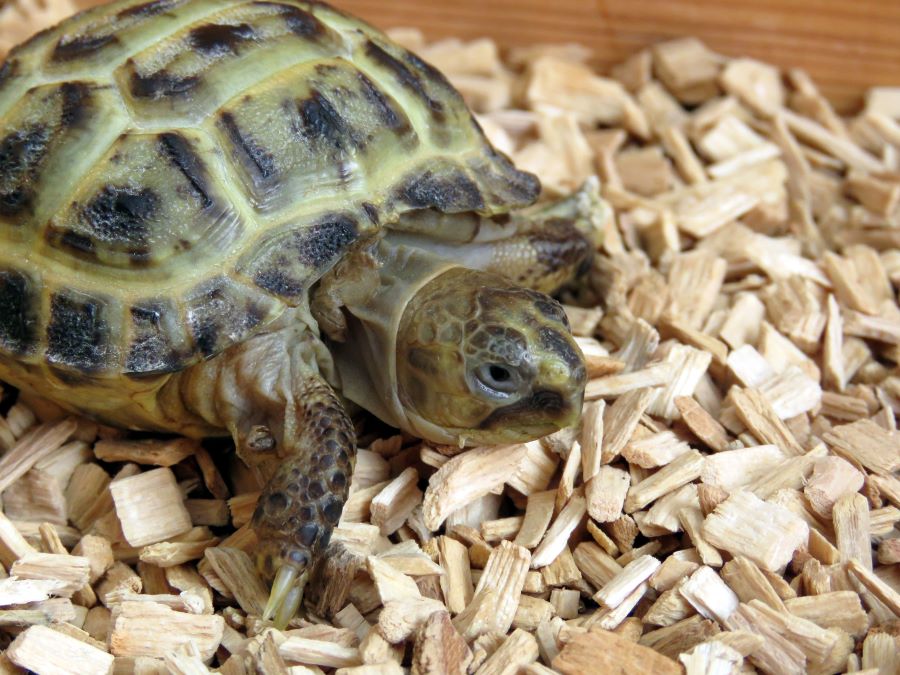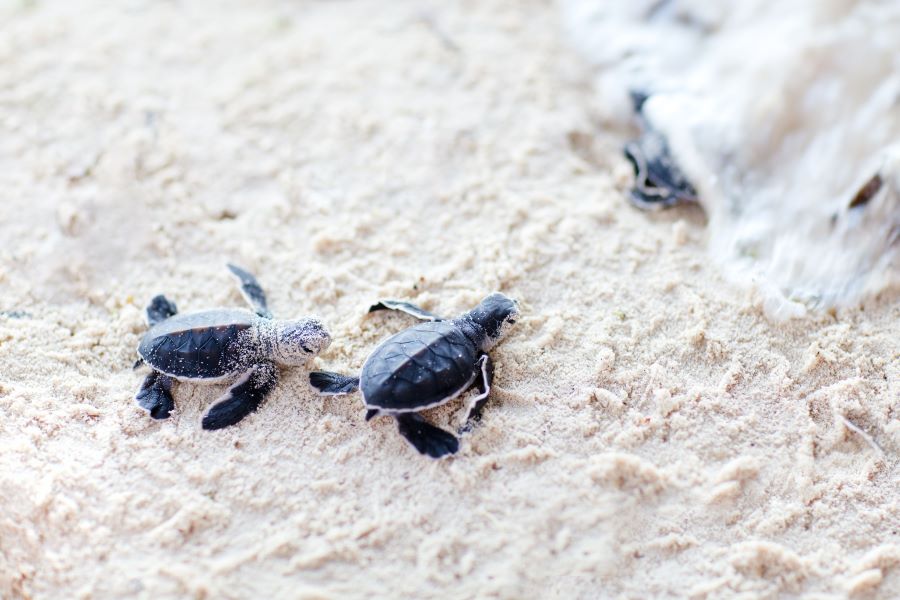Some of the posts on Mercury Pets contain affiliate links to products. That means if you click on that link and then make a purchase, we receive a percentage of the sale. We only recommend products we’ve used and support, and there’s no additional cost to you — the money goes right back into making this site the best it can be! Thanks for reading.

So, you’ve brought home your very first adorable baby tortoise, but you’re stumped by what to feed it. Should it eat mostly lettuce, or can I give it vegetable scraps from the kitchen? Am I supposed to buy special food for it? Hundreds of tortoise owners have asked these questions before you, and thankfully there are relatively definitive answers.
Tortoises are vegetarians. Their diet consists primarily of leafy plants and green vegetables, although they can eat some flowers and fruits. You should provide a baby tortoise with a balanced diet of grass, hay, and nutrient-dense leafy greens. If your baby tortoise is kept indoors, it is crucial to provide it with a Vitamin D3 supplement.
This article lists all the best foods to give your baby tortoise, how much and how often to feed them, whether different tortoises have different food preferences, and what types of food you should never give them.
Tortoises are Vegetarians
All tortoises are turtles, but not all turtles are tortoises. Confused yet? Well, tortoises are simply a subgroup of turtles, the same way chocolate ice cream is a subgroup of ice cream in general.
Now, turtles are mostly omnivores and will feed on both plants and other animals. Tortoises, on the other hand, are complete herbivores. Their diet consists only of plants, vegetables, and fruits. Baby tortoises should, therefore, be fed an exclusively vegetarian diet.
What Type of Food Should I Feed My Baby Tortoise?
When deciding what to feed your baby tortoise, keep in mind what its diet would have been like in the wild. This would mean the majority of your pet tortoise’s meals should consist of grasses and hay, a small part of fresh green vegetables, and occasional fruit.
Below is a list of all the types of fresh produce that will provide your baby tortoise with a well-rounded, healthy diet.
Plants
Almost 70% of a tortoise’s diet will consist of plants, including grasses, hay, flowers, and weeds. In most cases, the whole plant, excluding the roots, will be safe, but there are some exceptions. If you feed these plants to your baby tortoise, always make sure the majority of the plant is leaves with only a few flowers.
It is also important to shred the plants into smaller pieces to prevent choking.
The most beneficial plants include:
- Dandelion – A favorite with most tortoises, it should be offered as part of a varied meal as the plant may have a slight diuretic effect which may lead to dehydration.
- Clover – High in protein, red and white clover are great additions to a baby tortoise’s diet when offered in moderation.
- Ribgrass Plantain – A great bulk ingredient in any salad offered to a baby tortoise.
- Sow Thistle – Although they may look a bit prickly, they can’t hurt your tortoise and might become a firm favorite once first introduced into their diet.
- Red Deadnettle – Most nettles are suitable food for baby tortoises as long as they are picked and allowed to wilt before serving.
- Hedge mustard – Despite adding a variety of flavor to a baby tortoise’s diet, it should not be provided often as it contains chemicals that may damage the thyroid.
- Bramble – A perfectly safe plant, though brambles might not be your baby tortoise’s favorite, as they might not like the taste all that much.
- Alfalfa hay – The hay to beat all hays, alfalfa is a perfect filler plant and can be eaten in large quantities without issue. Most baby tortoises love the taste more than any other plant on this list.
- Hibiscus flower – A favorite of many tortoises, hibiscus flowers make a delicious occasional snack. Check out this video of baby tortoises trying hibiscus flowers. Though a word of warning: It will make your heart melt!
- Parsley – A great treat; it should be given in moderation due to its diuretic properties.
- Geranium – The flowers of all geranium plants are a particular favorite amongst tortoises. They may not be all that interested in the rest of the plant, though.
- Plantain lily – Suitable to be fed in moderation.
- Aloe Vera – A great plant to ensure your baby turtle remains hydrated, as long as the plant is cut into small enough pieces to prevent choking.
- Pansy – The flowers are an excellent option to provide some variety in your baby tortoise’s diet.
Some plants like chickweed and lemon balm can still be added to a baby tortoise’s diet, but in extreme moderation, as chemicals found in them may prevent nutrient absorption and damage essential organs. [Source]
Vegetables
Second to plants and grasses, vegetables should form the most significant part of your baby tortoise’s diet. A good rule to go by is to stick to mostly green, leafy vegetables with occasional exceptions. Vegetables are only recommended to add variety to your baby tortoise’s meals.
Suitable veggies include:
- Collard
- Kale
- Cabbage
- Chard
- Lettuce
- Endive
- Carrot tops
- Radish tops
- Sprouts
- Mushrooms
- Spinach
- Broccoli
- Zucchini
- Celery
Fruit
Fruit should only be seen as a treat, not as part of your baby tortoise’s regular diet. In most cases, one or two pieces of fruit every other day provide essential nutrients but should not be relied on to form the bulk of the food your tortoise eats.
Good fruit choices include:
- Papaya
- Fig
- Mango
- Kiwi
- Pineapple
- Melon – All melons are suitable
- Strawberry – Other berries are also acceptable, although they should be offered in extreme moderation
- Cherry
- Tomato – The fruit only, never feed tortoises tomato leaves or any other part of the plant
- Apple
Other
If a balanced diet is provided, it is very rarely necessary to supplement it with store-bought food. However, commercial tortoise food can be a good staple if it is difficult to source fresh produce. Just ensure the food you buy is made with baby tortoises in mind.

What Shouldn’t I Feed My Baby Tortoise?
There are many foods that may be detrimental to your baby tortoise’s health. Do not feed them to your pet under any circumstances. These include:
- Hot peppers
- Citrus fruits
- Dairy products
- Soybeans
- Avocados
- Most root vegetables, other than sweet potatoes and carrots
Some plants are toxic to tortoises and should also be avoided. They include:
- Avocado leaves and seeds
- Begonia
- Calla lily
- Daffodil
- Ficus
- Foxglove
- Gardenia
- Hyacinth
- Ivy
- Periwinkle
- Primrose
- Tomato leaves and vines
You must educate yourself on the plants in the tortoise no-go list and ensure your baby tortoise does not have access to them at any time.
How Much Should I Feed My Baby Tortoise?
Each meal should be about the size of your tortoise’s shell and should not be made up of only one plant or vegetable but a variety. A tortoise salad, if you please.
Allow your baby tortoise around four hours to eat its fill, then remove the remaining food scraps from its enclosure. Eating old produce may cause your tortoise to become sick.
How Often Should I Feed My Baby Tortoise?
Baby tortoises should be fed once a day. As they grow older, this should change to 5 days a week, with two fasting days at any point and in any order. The fasting days provide their digestive system with a break as its work is done rather slowly.
What Should I Feed a Baby Desert Tortoise?
Desert tortoises include those native to the USA and Mexico and the Sulcata Tortoise originating in the arid regions of Africa.
Desert tortoises are specially adapted to dry, hot living conditions. They may not respond well to fruits and should be provided with mostly grasses and weeds, similar to what they would have eaten in the wild.
What Should I Feed a Baby Grassland Tortoise?
The most popular grassland tortoise is the Hermann’s Tortoise. Replicating their wild diet would mean providing mainly grasses and hays, with the occasional vegetable like broccoli or zucchini. They may enjoy a fruit now and then, too.
What Should I Feed a Baby Tropical Tortoise?
These include Yellowfoot, Bell’s hinge-back, cherry-head red foot, and Aldabra tortoises. They may show a much greater affinity for fruits and vegetables, although these should still only be supplied in moderation. Their natural environment caters to a much wider variety in their diet, which should be kept in mind when deciding what to feed them.
Should I Give My Baby Tortoise Supplements?
Food supplements are essential for baby tortoises. The two most important are vitamin D3 and Calcium. Reptile multivitamins and immune support boosters can also be useful.
This is our recommended food supplement, which includes doses of both D3 and Calcium.
Vitamin D3
As tortoises spend most of their lives outdoors, they can usually synthesize their own vitamin D3. In the case of baby tortoises or tortoises kept indoors, a powder supplement is vital.
Without it, a baby tortoise may become very ill and not grow properly. [Source]
The easiest way to administer vitamin D3 to a baby tortoise is to brush its food with the powdered form of the vitamin. Another option is to set up a UV light source in your tortoise’s enclosure, although this will have to be replaced every year.
Vitamin D3 is necessary to allow normal absorption of minerals like calcium and phosphorus by a tortoise’s body.
Calcium
Dandelions are one of the most calcium-rich plants available to tortoises. This may not, however, be enough to fulfill a baby tortoise’s demand for the mineral.
Luckily, calcium powder is also available and should be dusted onto your baby tortoise’s food two to three times a week.
Calcium promotes healthy bone development, and since a tortoise’s shell is actually part bone, it is vital to letting your baby tortoise grow and develop properly.
Multivitamins
Although some tortoise owners refuse to give their pets multivitamins, others swear by them. It can be challenging to provide the exact combination and quantity of food to ensure your baby tortoise is getting all the vitamins, minerals, and nutrients it needs.
If you suspect your baby tortoise may be developing a deficiency, a synthetic vitamin and mineral source may be necessary.
This can come in the following forms:
Multivitamin Powders
Besides calcium and vitamin D3, multivitamin powders may also contain minerals like phosphorus, magnesium, copper, and iron.
If you are worried your baby tortoise is not getting enough protein, many multivitamin powders also contain essential amino acids, which may supplement a protein deficiency. Vitamins included in these powders may also include niacin, folic acid, and a variety of B vitamins necessary to maintain normal bodily functions.
Fortified Feed
Produced by vets and zoos, fortified food pellets can form part of your tortoise’s diet to ensure it gets the full range of minerals and vitamins it requires. You should consult your vet before giving your baby tortoise fortified food, as it should be done in the right quantities and with the correct frequency.
Whenever evaluating whether your baby tortoise needs supplements outside of the recommended calcium and vitamin D3, you should consult your vet. Excesses of some of these substances may be more detrimental to the health of your pet than helpful.
Conclusion
It can seem tricky to choose the right diet for your baby tortoise, but as long as a ratio of 75:20:5 of plants:vegetables:fruits is maintained, your tortoise should have access to most of its needs.
Since a tortoise’s health relies heavily on its nutrition, if you suspect something may be missing from its diet, or being given in excess, consult with an exotics vet to ensure you are on the right track so that you and your new pet can spend a long, happy time together.



